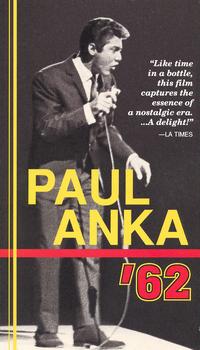Lonely Boy (film)
| Lonely Boy | |
|---|---|
 VHS cover | |
| Directed by | Wolf Koenig Roman Kroitor |
| Produced by | Roman Kroitor |
| Starring | Paul Anka |
| Edited by | John Spotton |
| Distributed by | National Film Board of Canada (NFB) |
Release date | 1962 |
Running time | 27 min. |
| Country | Canada |
| Language | English |
Lonely Boy is a 1962 cinéma vérité documentary about the former teen sensation Paul Anka. The film takes its name from Anka's hit song, "Lonely Boy", which he performs to screaming fans in the film. This short documentary makess use of hand-held cameras to record intimate backstage moments.
Co-directed by Roman Kroitor and Wolf Koenig, this National Film Board of Canada production won a Canadian Film Award as top film of the year and was nominated at the BAFTA Awards for its best short film prize.
Influence
Lonely Boy was a substantial influence on the Peter Watkins film Privilege. Watkins had studied it in preparation for filming[1] and his film deals with the phenomenal popularity of a pop singer and its abuse for political motives. One scene showing the central character, Steven Shorter, at a table with a venue owner is virtually a one-to-one reproduction of a scene in Lonely Boy, even using the same name (Uncle Julie) for the like-mannered venue owner. The cinéma verité style of Lonely Boy was also adopted, and one DVD release of Privilege included Lonely Boy as well as an excerpt of an essay on that film as extra features.[2] The film's importance in the evolution of documentary film making was explored in the film Cinéma Vérité: Defining the Moment.[3]
References
- ^ Peter Watkins, Part 2, Films, Privilege.
- ^ Privilege at DVD Verdict.
- Greg Bennett "Hidden Gem: ‘Privilege’" At The Cinema, March 29, 2011 - ^ Crow, Jonathan. "Cinema Verite: Defining the Moment (1999)". New York Times. Retrieved 24 November 2013.
External links
- 1962 films
- Canadian films
- English-language films
- National Film Board of Canada documentaries
- Documentary films about singers
- Canadian short documentary films
- Black-and-white documentary films
- Genie and Canadian Screen Award-winning films
- 1960s documentary films
- Films directed by Roman Kroitor
- Canadian documentary film stubs
- Music documentary film stubs
- 1960s Canadian film stubs
